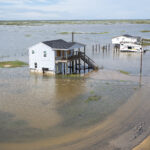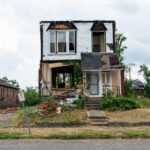Florida homeowners’ insurers are poised to thrive following Hurricane Irma. For years, critics have disparaged Florida’s unique homeowners’ insurance industry. These innovative and entrepreneurial insurers are about to prove critics wrong.
The $100B Detour
It should first be acknowledged that luck is a factor. Florida’s homeowners’ insurers breathed a sigh of relief when Irma turned west and gradually lost its strongest windspeeds. Irma could have resulted in $200 billion in losses if it made landfall as a Category 5 in Miami. Instead of following this devastating path, Irma made a northerly turn as it approached Florida’s west coast and quickly weakened as it turned inland. Irma ultimately spared Florida’s most dense populations from the most catastrophic damage, and damage estimates decreased from hundreds of billions to under $40 billion.
Unparalleled Reinsurance Programs
Irma’s detour is not the only stroke of luck for these insurers. Leading up to Irma, Florida insurers have used a decade-long hurricane drought as an opportunity to strengthen reinsurance programs. When Irma made landfall, Florida’s 50 domestic homeowners’ insurers had accumulated $40 billion in capital to insure their 60 percent share of the homeowners’ insurance market.
For most insurers, Irma’s magnitude translates to only a fraction of direct expense. Although responding to claims will test insurers’ operational capacity, from a financial standpoint, reinsurers will pick up a vast majority of the tab. Florida’s Hurricane Catastrophe Fund is also available to insurers and offers $17 billion in additional protection.
After a decade without a hurricane in South Florida, Florida’s insurers invested significant portions of revenue into affordable comprehensive reinsurance. As a result, these insurers are prepared to endure a storm of Irma’s magnitude.
Florida Hurricane Recovery Obstacles
Florida insurers have developed policies to mitigate potential exposure for hurricane damages. Three protections are worth highlighting. Homeowners cannot file a claim later than three years after the event. Additionally, insurers can include higher deductibles for hurricane losses, deterring the vast majority of low value litigation. A third key protection is that Florida homeowners’ insurers generally exclude flood damage from coverage.
Although these protections seem subtle, insurers that handled one million insurance claims arising from Hurricane Wilma know that everything counts.
Mature Claims Departments
The assignment of benefits (AOB) crisis prepared Florida homeowners’ insurers for the inevitable onslaught of disputed Irma claims and litigation. Since 2015, many insurers have built strong departments staffed with claims experts and attorneys who are trained to rapidly resolve disputed claims and litigation.
To support these expert teams, these insurers also have access to unmatched claims litigation technology. In addition to helping insurers efficiently close claims and cases, this technology arms insurers with real-time analytics exposing the emerging litigation trends throughout Florida.
Additionally, the AOB crisis led these insurers to develop relationships with their insureds. Insurers’ marketing and claims teams have joined forces to inform homeowners about the perils of allowing public adjusters, water mitigation contractors, and attorneys take control of their claims. As Irma approached, these insurers used email, social media and even traditional media to warn insureds about potential scams. Thanks to these efforts, policyholders have a better chance of avoiding claims disputes created solely to enrich third parties.
With teams, technology, and connectivity typically reserved for national insurers, Florida homeowners’ insurers have the foundation to effectively navigate through this storm.
Savvy Entrepreneur Leadership
Companies with these strengths always have strong leadership in common. When the largest insurance companies fled the market out of fear, several savvy entrepreneurs were there to replace them. Unlike the national behemoth insurance companies mired by bureaucracy and management layers, these entrepreneurs are active leaders who innovate to preserve their businesses.
Evidence from the Stock Market
Wall Street is confident in the Florida homeowners’ insurance market. After sustaining a hurricane that covered the entire state, one would expect shares in Florida homeowners’ insurers to plummet. While these stocks did indeed drop leading up to Irma, Florida’s publicly-traded homeowners’ insurers have nearly returned to their pre-hurricane values, and some are even higher post-Irma. At this early stage in the financial assessment of Irma’s impact, there is no better market confidence indicator than stock value.
Florida Strong
After years of criticism, Florida’s homeowners’ insurers have the opportunity to prove their strength and staying power. Led by some of the most successful entrepreneurs in the industry, Florida’s homeowners’ insurers are about to pass one of the biggest tests any insurer has ever faced.
Was this article valuable?
Here are more articles you may enjoy.


 ‘Door Knocker’ Roofers Were Everywhere. NC Farm Bureau Saw an Opportunity
‘Door Knocker’ Roofers Were Everywhere. NC Farm Bureau Saw an Opportunity  Apollo Expands Asset-Level Risk Reviews to Reflect Impact of Extreme Weather
Apollo Expands Asset-Level Risk Reviews to Reflect Impact of Extreme Weather  Marijuana’s Move to Schedule III: What it Really Means for Cannabis Insurance
Marijuana’s Move to Schedule III: What it Really Means for Cannabis Insurance  LA Fires Push Insurers’ 2025 Disaster Losses to $107 Billion
LA Fires Push Insurers’ 2025 Disaster Losses to $107 Billion 